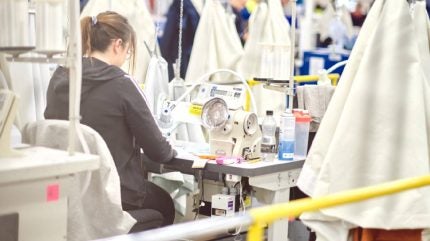
The “Lessons Learned from Operation Tacit” review, presented by Labour Market Enforcement director Margaret Beels, found that while some breaches of employment law were identified, these did not meet the threshold for “prosecutable offences” relating to forced labour or modern slavery.
Operation Tacit focused on examining reports of modern slavery and labour exploitation within Leicester’s garment sector.

Discover B2B Marketing That Performs
Combine business intelligence and editorial excellence to reach engaged professionals across 36 leading media platforms.
This review examines the period starting with the initial pilot operation in the industry in 2020 and continues through to the start of Operation Tacit in 2022, as well as investigations by enforcement agencies.
The report said that “investigations by enforcement bodies with powers and expertise found no evidence of prosecutable offences”.
The National Crime Agency (NCA) also supported these findings, stating that “it is highly likely the industry only contains a small number of modern slavery or human trafficking victims,” suggesting that the scale of serious abuse was minimal.
Beels cautioned that describing wider workplace concerns using the term “modern slavery” could have been misleading.

US Tariffs are shifting - will you react or anticipate?
Don’t let policy changes catch you off guard. Stay proactive with real-time data and expert analysis.
By GlobalData“Using the language of modern slavery could have had a negative impact on the industry… allegations risked the deployment of the wrong resources and gave workers a sense that their concerns were being downplayed,” she said.
The review further established that Leicester’s garment factories generally had lower rates of non-compliance with national minimum wage regulations when compared to other parts of UK manufacturing.
The report also confirmed that “the overall findings of Operation Tacit were that the degree of non-compliance with the National Minimum Wage in Leicester’s garment sector was lower than in other manufacturing”.
Although investigators documented poor practices such as underpayment and insufficient record-keeping, these instances did not reach the legal definition required for action under the Modern Slavery Act 2015.
The report was welcomed by industry leaders, who call it a long-awaited “myth buster” for Leicester’s garment sector.
Fashion-Enter founder and Apparel and Textile Manufacturers Federation (ATMF) chair Jenny Holloway said the findings support local businesses that experienced reputational and commercial damage as a result of sensationalised media reporting.
“The untold harm of inflammatory rhetoric in press and TV documentaries has resulted in retailers and brands leaving Leicester with concerns of reputational damage. Now the evidence is here for all to review. These are hardworking, skilled, ethical factories that have been penalised unnecessarily – they are owed an apology,” Holloway said.
The report suggests efforts to strengthen local support frameworks such as revitalising the Leicester Labour Market Partnership and maintaining backing for organisations including the Leicester Fashion Technology Academy and Fashion Advice Bureau – Leicester (FAB-L).
Meanwhile, Beels called for cross-sector cooperation to build a compliant manufacturing base.
She said: “There are useful initiatives underway to support the growth of a compliant garment industry in Leicester and these need to be encouraged.”
The report also proposed convening a summit, led by the Garment and Textile Workers Trust, to secure long-term funding for worker support.
Operation Tacit, described as the largest multi-agency investigation into workplace non-compliance ever conducted in the UK, involved more than ten government and enforcement organisations including HMRC, the Gangmasters and Labour Abuse Authority (GLAA), the Health and Safety Executive and Leicester City Council.
The comprehensive review was published under Section 5(1)(b) of the Immigration Act 2016.
These spot checks were prompted by allegations of unsafe conditions and worker exploitation that emerged during Leicester’s localised Covid lockdown.





